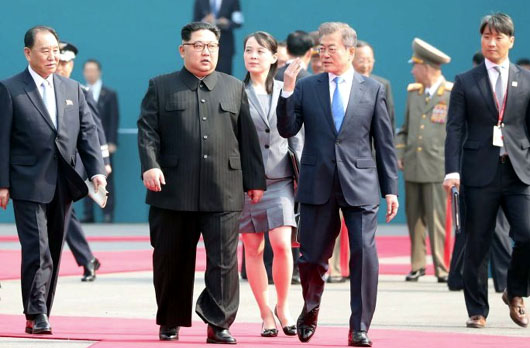Special to WorldTribune.com
 By Donald Kirk
By Donald Kirk
SEOUL — Anti-Japanese sentiment in South Korea is approaching the level of mass hysteria. President Moon Jae-In sees it as a unifying force that will draw Korea’s disparate political forces in common cause. How can rightists go on waving those Korean and American flags, calling for a hard line against North Korea, when outcries against another historic foe dominate the headlines?
For now, it’s as though the Japanese were really the evil ones, the colonial occupiers who forced tens of thousands into slave labor, into prostitution, into total abject subservience to the conquerors.

Forget North Korea. Kim Jong-Un is now South Korea’s friend. Koreans must not remember him as the dictator who executed his closest relatives, his own bureaucrats and military officers, not to mention thousands of poor people who somehow seemed to betray his rule.
As for North Korea’s invasion of South Korea, you won’t hear anyone in authority in Seoul blaming Kim’s grandfather, Kim Il-Sung, for a thing. Never mind that the founder of the “Democratic People’s Republic of Korea” ordered a war that cost the lives of millions of North and South Koreans, not to mention a few hundred thousand Chinese fighting on the North’s side and 40,000 or so troops from the U.S. and other allies of the fledgling Republic of Korea.
Related: Report challenges legal, factual basis for impeaching South Korea’s conservative president, July 16, 2019
Japan, as far as the Moon government is concerned, is the real enemy. While encouraging a reconciliation process with North Korea that will never persuade Kim Jong Un to give up his nukes and missiles, Moon sees Japan as a target that everyone loves to hate. What could be easier than to whip up mass support for demands for the Japanese to pay back multi-millions to old men who were forced to serve huge Japanese companies as slave laborers during the Pacific War? And who could not feel sorry for tens of thousands of Korean women who were forced to serve Japanese soldiers? Only a few are still alive, but these sensitive issues, for the Moon government, take priority over North Korea’s nukes and missiles.
The Japanese, however, are not interested in revising two agreements that they firmly believe are still in force, the first reached in 1965 with President Park Chung-hee, the second half a century later with his daughter, President Park Geun-Hye.
Korea and Japan are not at the point of breaking diplomatic relations, the crucial element in the 1965 treaty, but Korea has just about renounced the detail under which the Japanese provided hundreds of millions of dollars in loans and grants as final restitution for everything. The Koreans firmly believe that Korean workers are owed much more. Similarly, they want no part of the deal that Park Geun-Hye struck with the Japanese on comfort women in 2015 under which a foundation, since dissolved by the Koreans, paid the few surviving comfort women the equivalent in yen of $100,000 each.
Moon could not have come up with a more emotional, politically hot issue than that of the iniquities of Japanese rule. The firm position of his government provides a distraction from Korea’s economic woes, including youth unemployment. At a time when his popularity has been declining, he has his conservative critics on the defensive, unable to appear to be taking the side of the hated Japanese.
The policy, however, carries grave risks. Japan’s conservative Prime Minister Shinzo Abe can also appeal to anti-Korean sentiments among Japanese citizens. Japan has already deeply upset Korea by placing restrains on exports of three chemicals needed for production of semiconductors, the country’s most successful product, vital for all the electronics goods produced at home and one of its leading export items. The Japanese rationale for this decision is that some of these chemicals have wound up in North Korea in violation of sanctions. The Japanese, moreover, have hinted that this constraint is just the beginning, that Japan could also inhibit or block the flow of other products badly needed for Korean industry. Moon has called for looking for supplies elsewhere, but that won’t be easy
By getting tough with Japan, Moon may regain lost popularity but risks compromising the U.S.-Korean alliance. Trilateral cooperation among U.S., Korean and Japanese forces appears in jeopardy. South Korean forces may still participate in computer-driven war games with the Americans, but Moon*s government may well do away with the agreement with Japan on sharing intelligence information.
The real winner in this controversy will be North Korea.
Moon has made reconciliation with the North the centerpiece of his policy, but he may really get nowhere in doing away with the threat posed by Kim Jong-Un. Perhaps, more logically, he should be demanding that North Korea not only apologize for invading South Korea in 1950 but pay back the damage caused by the war.
That’s not going to happen, but North Korea owes a far bigger debt than does Japan for the harm it caused the Korean people.
